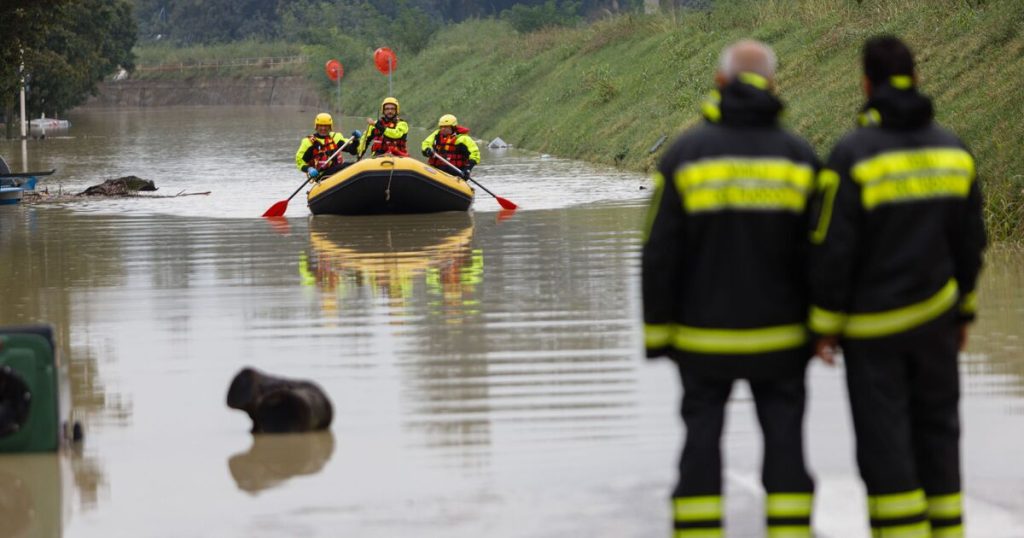Heavy rain and flooding have prompted the government to issue a warning to British tourists planning trips to Italy.
European Union chief Ursula von der Leyen The government yesterday announced billions of pounds of aid for badly hit central European countries, which have lost 24 lives and suffered extensive damage to infrastructure and homes in recent days.
The Ministry of Foreign Affairs has stressed the seriousness of the situation in updating its latest travel advice.
Its press release states: “Serious flooding is currently affecting the Emilia-Romagna region.
“There may be risks at river banks, green areas affected by flooding and stagnant water. Rail services between Faenza and Forli and Porto Maggiore and Ravenna are suspended.”
She added: “The Ferrovie dello Stato website has more information. Check with your tour operator or accommodation provider before travelling and follow the instructions of local authorities.
“The website of the Civil Protection Department contains further information (in Italian only).”
During her brief visit to a flood-hit area in south-eastern Poland, von der Leyen met with leaders from Poland, Austria, the Czech Republic and Slovakia.
She assured the affected countries that the EU Solidarity Fund would provide rapid financial support for infrastructure repairs, as well as an additional £8.4 billion (€10 billion) from the Cohesion Fund for urgent restoration efforts. In an unprecedented move, these countries will not be required to provide co-financing for the aid.
Ms von der Leyen said at a press conference: “This is 100% European funding, no co-financing is required.
“We are living in extraordinary times, which require extraordinary measures.”
Heavy rains have forced the evacuation of around 1,000 people in the Emilia-Romagna region. In central Europe, receding waters have revealed the extent of the damage caused by torrential rains that began a week ago.
Czech Interior Minister Vit Rakusan reported one new death in the hard-hit northeast of the country, bringing the total number of deaths in the Czech Republic to five. Seven people died in Poland and Romania and five in Austria, bringing the total number of victims to 24.
Troops have been deployed to help with the reconstruction efforts. In northeastern Czechia, soldiers and emergency crews, including firefighters, have worked together to deliver aid. Army helicopters have delivered supplies and temporary bridges have been built to replace those washed away by flooding.
About 400 people were evacuated from their homes in Ostrava, the region's capital. Although the Luznice River reached dangerous levels in the town of Veseli nad Luznici, the evacuation was not necessary at that time, authorities said.
In Austria, cleanup efforts continue after flooding caused landslides, mudslides and bridge damage. Firefighters and soldiers have been working to pump water and mud from homes and remove debris, fire department spokesman Klaus Stebal reported, according to ORF. Lower Austria Governor Johanna Mikl-Leitner noted that full reconstruction could take years.
In Vienna, almost a million litres of water have been pumped into public transport since the floods began, and ten areas remained inaccessible yesterday, according to the Austrian Press Agency (APA).
In Hungary, floodwaters continued to rise, forcing authorities to close roads, railway stations and ferry services on the Danube. In Budapest, floodwaters overflowed lower embankments and threatened tram and metro lines, leading to the suspension of some public transport services.
The Danube reached 7.6 metres (25 feet) high, approaching the record of 9.9 metres (32 feet) set during the 2013 floods. Further upstream, in the Danube Bend, houses and restaurants were submerged.
Nearly 6,000 professionals, including members of the Hungarian Water Administration, military personnel and even prisoners, were mobilized to fill the sandbags. Prime Minister Viktor Orban gave an update at a press conference, stressing the government's continued efforts to manage the situation.
In southwestern Poland, Wroclaw had to deal with a rise in the Oder River, which reached 6.5 metres, two metres above the emergency level. However, the floods were not as severe as those of 1997.
In the worst-hit towns of Stronie Slaskie and Ladek-Zdroj, running water and electricity were restored thanks to a local resident's call for help. Prime Minister Donald Tusk invited von der Leyen and other Central European leaders to Wroclaw to assess the damage on the ground.
In northern Italy, rivers burst their banks in the provinces of Ravenna, Bologna and Forli-Cesena, prompting mayors to advise residents to stay on upper floors or evacuate.
The region had already suffered devastating floods in 2023. Italy's deputy transport and infrastructure minister, Galeazzo Bignami, confirmed that two people were missing in the province of Ravenna, where 800 residents, as well as 200 in the province of Bologna, were evacuated to shelters.
Trains have been suspended, schools closed and travel advised against in affected areas.


